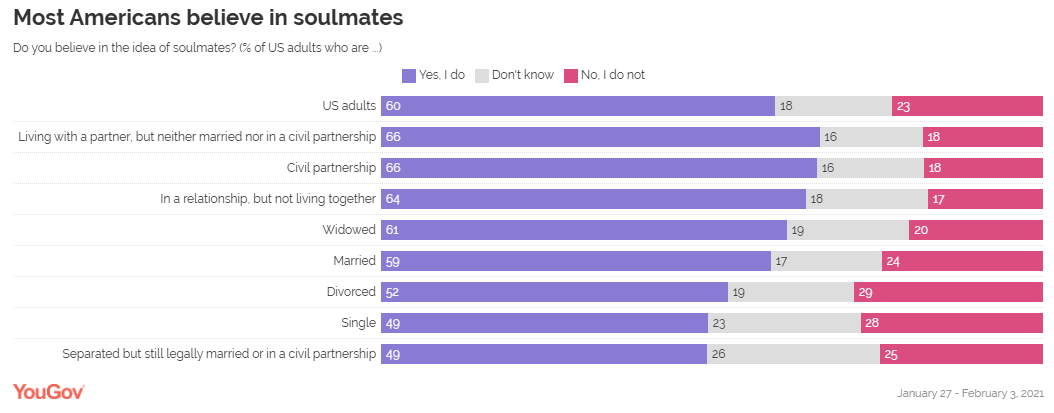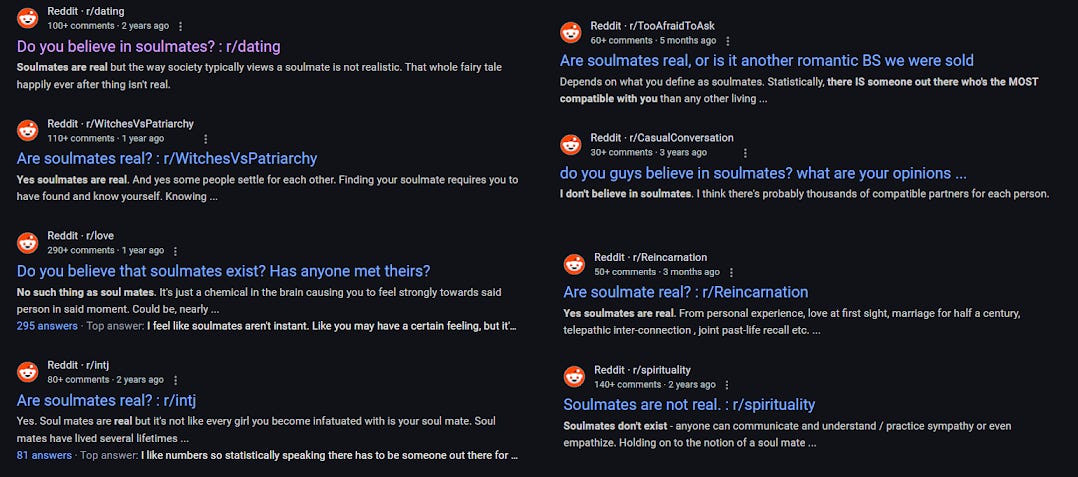Squeezed by the Bay Area housing market, Rationalists don’t let anyone live rent-free — even beliefs. They demand payment in anticipated experiences, and exile freeloaders to Marin County where no one can hear them falling in the woods.
But beliefs can also pay rent in other ways, such as existential comfort or coordination with others. People like these “theological” beliefs to be laid out scripture, which standardizes the belief for sharing with friends and gives it authoritative power. For the belief that God cares about you: the Bible. For the belief that Clippy doesn’t care: Superintelligence. For the belief that rich people deserve to have their shit stolen: Das Kapital. That the poor deserve to: crypto whitepapers.
Three out of five Americans believe a proposition for which there is neither scientific evidence nor a holy book1. A proposition that would seem to have important implications for their personal lives, yet it’s unclear what role it plays day-to-day. They believe in soulmates.

Are soulmates real? Let’s survey the experts. r/dating and r/Reincarnation argue for the affirmative, but r/love and r/spirituality stand firmly against. r/intj is judgy and nerdy, as you’d expect, and r/WitchesVsPatriarchy believes in you. Hmm, this question is proving trickier than anticipated. Let’s take a step back.
What exactly do people believe when they believe in soulmates? Here are some attributes commonly associated with the term:
Uniqueness — There is exactly one match for each person…
Predestination — …and fate will inevitably bring them together.
Immediate recognition — Soulmates will know each other at once…
Perfect compatibility — …and get along smoothly in an effortless fit.
Special connection — The spiritual bond makes you feel complete…
Permanence — …and once established, it lasts forever.
It’s pretty hard to reconcile all six attributes with the survey statistics. Partnered people are likeliest to believe in soulmates, yet few of them will say that getting along with their partner is smooth and effortless. The fact that divorced people are more soulmatey than singles is hard to reconcile with uniqueness, immediate recognition, or permanence. 70% of women believe in soulmates and love at first sight, but a similar number believe that you must never sleep with someone on the first date. Putting these together, at least half of these “romantic” women seem to believe that their true soulmate would be turned away by sex.
People’s behavior is also difficult to make sense of in light of this belief. People compile lists of mandatory attributes and icks, swipe endlessly on apps yet refuse to travel to the next town for a date, stay for years in crappy relationships yet “keep their options open” in promising ones. Whatever is going on, it seems more complicated than people explicitly endorsing the list of soulmate attributes and conducting their dating lives in accordance.
Can we make any sense of “soulmates”? Can we make any use of the idea? And where does this belief even come from if not from holy scripture nor from people’s personal experience?
I’m far from an authority on soulmates; my own wife predicted that married people would believe in soulmates less because “at that point they should know better”. But I know some things about sports movies, Mentos, wu wei, and game theory. It’s time to shed some light on soulmates.
Sally in Seattle
We know how people learn the idea of soulmates: not from a book, but from Meg Ryan.
Classic rom-coms are structured entirely around the idea. They invariably feature two people set on a collision course by destiny, obstacles and resistance overcome, a dramatic moment of recognition imbued with cosmic significance, and a happily-ever-after once the couple recognizes their soulmatehood. Were we all taught to expect our dating lives to unfold exactly like this?
Meg Ryan is 63 right now, and rom-coms were an early casualty of Hollywood’s death spiral into self-referential post-irony. No one makes sincere rom-coms anymore, and no one reading a Substack about dating remembers seeing a live one in person. There is something about the soulmate narrative that appeals separately to people and to 1990s Hollywood executives. That thing is: legibility.
Keep reading with a 7-day free trial
Subscribe to Second Person to keep reading this post and get 7 days of free access to the full post archives.





